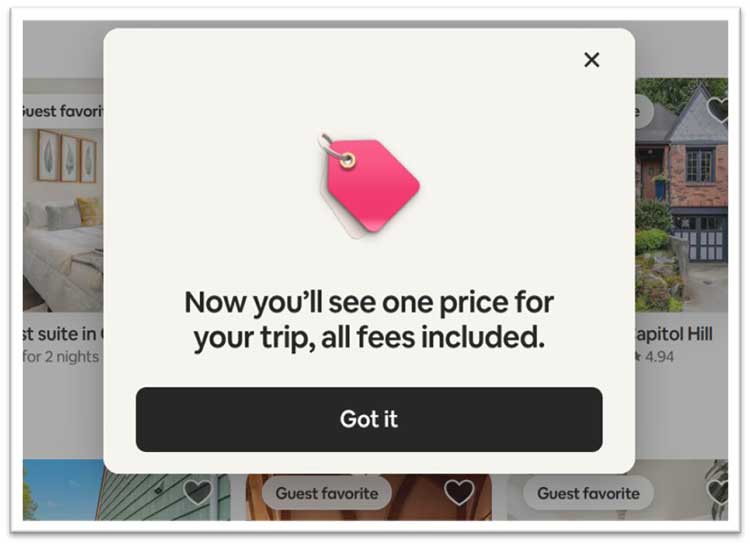New Federal Rule Bans Hidden Hotel and Ticket Junk Fees
Last updated June 4, 2025
In a rare win for consumers, the Federal Trade Commission’s (FTC) Rule on Unfair or Deceptive Fees took effect on May 12, requiring booking websites for hotels, vacation rentals, and concert and sports tickets to disclose all mandatory fees in advertised prices. Instead of surprising customers at checkout by adding “service fees,” “convenience fees,” or “resort fees,” companies must include these costs upfront and in search results.
Listen to audio highlights of the story below:
“The goal of this rule is to facilitate comparison shopping and informed consumer choices, so that consumers can make informed decisions about where they stay during their travel and which live event tickets they wish to purchase,” said Annette Soberats, an attorney in the FTC’s division of advertising practices.
Hidden fees are a hot-button issue for consumers and advocates who pushed for this rule.
“Junk fees are an enormous scourge in the American economy,” said Erin Witte, director of Consumer Protection at the Consumer Federation of America.
During its rulemaking process, the commission received more than 60,000 comments.
“They were frustrated with trying to buy tickets to an event, only to be hit with expensive and mysterious fees when they went to pay,” Soberats told Checkbook.” They also told us about hotel room rates that ended up being far higher than what they expected due to poorly disclosed fees.”
What the FTC’s Disclosure Rule Requires
Under the FTC rule, the total price displayed must include “all charges or fees the business knows about and can calculate upfront.” This includes charges for goods or services customers must buy as part of the transaction, or a fee for paying with a credit card when there is no other viable payment method.
When a fee is refundable, that must be disclosed.

Companies can still exclude from advertised prices taxes or other government charges, shipping charges, and charges for optional goods or services people may select to buy as part of the transaction. But these additional costs must be reported before payment is collected and displayed “as prominently as, or more prominently than, the total price.”
The FTC’s rule applies to advertisements that appear online (including through mobile applications), in physical locations, or are displayed through other means.
Price Transparency Makes it Easier to Find the Best Room Rates
Until now, booking a hotel room was frustrating because hotels were not required to advertise all-in pricing. In many cases, displayed prices were not the actual per-night rates.
Let’s say you’re deciding between two hotels. One has a nightly rate of $200; the other charges $175 for a comparable room. So, to save money, you choose the one for $175.
But, a few screens later, you discover a $50 “facility fee” was added to the $175 nightly rate. If the hotel with the $200 rate does not charge any fees, it would be cheaper.
Research shows that in the scenario above if you even notice the extra fee you’re likely to pay the higher price, rather than starting the process over again. By requiring hotels to display prices that include any required fees, the new rule makes shopping for price far easier.
New Rule Does Not Prohibit Added Fees
The Unfair and Deceptive Fees rule does not limit the add-on fees that hotels and ticket vendors can charge. It only requires that the true price be “clearly and conspicuously” disclosed.
And the rule doesn’t apply to other types of businesses. For example, you’ll still get hit with added fees at checkout when ordering from restaurant delivery apps.
Is it Working?
Consumers’ Checkbook spot-checked the websites of big hotel chains, vacation rental platforms, and ticket sellers. The five largest U.S. hotel companies—Wyndam, Choice, Marriott, Hilton, and Intercontinental Hotels Group (IHG)—all showed us total prices for our sample stays, including any mandatory fees.
Some chains made it easy to see the breakdown of charges. Intercontinental separated the room rate and the fees and listed those under the total price.
Choice and Marriott used pop-ups to provide details of what the resort fee covered and a breakdown of the room rate, taxes, and fees.
But the important thing is that each reported total prices that we could use to sort, filter, and compare to find the best rate.
Ticketmaster now lists the full price of each ticket on its seat selection page. We got a breakdown of the ticket price and service fee once we chose our seats. StubHub also now lists total prices.
Enforcement
Companies that ignore the rule can be fined up to $50,000 per violation. If you encounter hidden fees that are banned by the FTC’s new rule, file a complaint.
More Info: The FTC has an FAQ page on its website that explains specific details about the Junk Fee Rule.
More from Checkbook
- 60 Top Travel Tips
- Hotels Gouge Guests with Absurd Resort Fees
- Federal Regulators Cracking Down on Hidden Fees
- Consumerpedia episode 41: Hotel Intel: Finding the Best Rates
- Consumerpedia episode 31: Watch Out for These Common Tricks & Traps
Contributing editor Herb Weisbaum (“The ConsumerMan”) is an Emmy award-winning broadcaster and one of America's top consumer experts. He has been protecting consumers for more than 40 years, having covered the consumer beat for CBS News, The Today Show, and NBCNews.com. You can also find him on Facebook, Blue Sky, X, Instagram, and at ConsumerMan.com.


